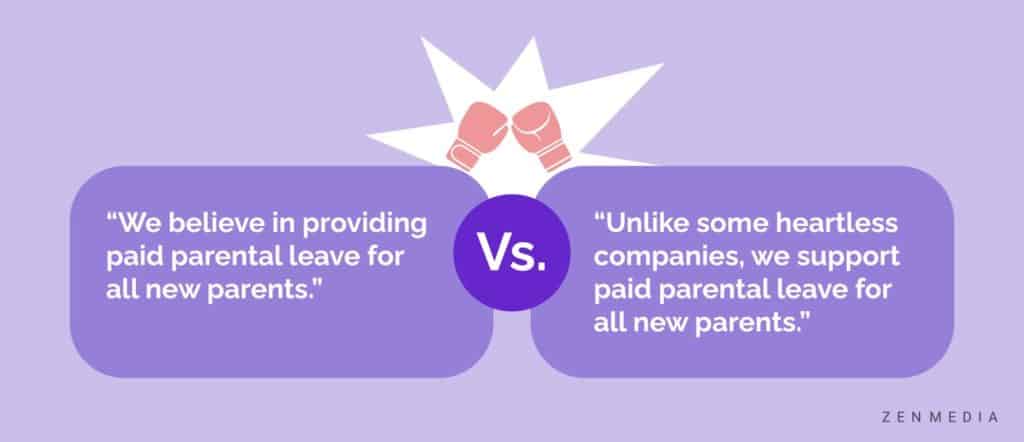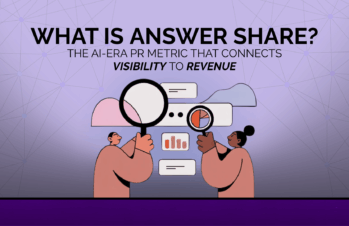We are consuming media 24/7.
Whether it’s on our television, our social media, in our email, or in a physical newspaper—we are all acutely aware of the top news stories.
While knowledge is power, staying in the know can be a hard pill to swallow, too—what with global health crises, natural disasters, food shortages, and war being heavy-hitting topics. Doomscrolling is inevitable.
Everyone is trying to find ways to stay relevant and stay in business at the same time. And while we’re all about commenting on trends, joining public conversations, and finding newsworthy tie-ins, that gets tricky when the current event dominating the news cycle is—well, controversial.
Related reading: What Does Going “Viral” Mean Anyway? – Zen Media
From Covid-19 vaccine debates to local elections to the war in Ukraine—there is a lot going on.
But should your business be weighing in?
The pros and cons of speaking up
As you know by now, there are pros and cons to every post you make. While it’s completely understandable to want to contribute to the narrative of controversial topics, sometimes silence is golden.
On the other hand, if everyone in your industry is speaking out about something—say, sustainability—and you’re not, your silence can communicate that you disagree or don’t care, which can also be damaging.
Speaking out is risky, but so is holding back.
So in this damned if you do, damned if you don’t scenario—what’s the solution?
In this time of Corporate Social Responsibility (CSR), many are finding that speaking out—tactfully—is prudent. According to the Public Affairs Council’s 2021 survey, more than 80% of companies said they were engaged in civil rights issues such as equity on race, gender, and sexual orientation, and more than 70% said they were public in supporting gender identity equality. That data is worth noting when you are deciding whether or not you want your company to give its two cents on an issue.
In the end, you have to focus on what matters. What adds value to your company? What poses a risk to continued success? These are things to definitely keep in mind when you’re determining how to handle controversial topics.
Going silent on social media
A lot of companies and organizations pre-schedule their social media. It’s convenient and saves time, and we’re all for it—most of the time.
Here’s when it’s not ok:
We all love a good “Happy Taco Tuesday!” post—unless it’s on a day that something tragic happens. Marketers are masters of the media, and we should all stay in the know so that when tragedies happen, we can pull posts that may come across as disrespectful, or simply, not worth discussing. Many of us, Zen Media included, made decisions to stop or slow posting at different points over the last few years—Covid-19, acts of domestic violence, the situation in Ukraine—all of these important and devastating events created situations where people didn’t want to have lighthearted conversations about tacos or tweets or trends.
Related reading: Ultimate Guide to B2B Social Media Marketing
In these cases, even if you choose to never publicly discuss the event, going silent can be a sign of respect. It also gives you time to determine if you do want to discuss the event, and, if so, the most tactful and sensitive way to do it.
Update your iconography
Want to extend support in a visible way? Consider changing your company icon or iconography to colors that tie to a cause. Google is famous for their ever-changing company logo, which takes on new colors, fonts, and animations depending on whether it’s Women’s History Month, Earth Day, or supporting a cause.
Grammarly, a Ukrainian-founded company, has changed their logo to blue and yellow in support of the Ukrainian people at this time, and many others have followed suit. During Gay Pride week, many companies use rainbow hues on otherwise monochromatic iconography to illustrate their support. And of course, when July rolls around, many American companies will rework their iconography to include stars, and stripes amongst red, white, and blue.
These visual adjustments are an easy, yet distinct way to send a message about what your company does or does not support.
Keep it classy
Everyone has opinions, and if your brand holds a strong opinion that ties into the fabric of your values and mission—you should absolutely speak up about relevant topics—even the controversial ones.
But there is a way to present strongly held convictions that will elevate your brand to those who agree, and there’s a way to do it that won’t demonize those who disagree. You have to keep it classy. Avoid heavily biased language or language that—quite frankly—might offend.
One way to do this is to focus on your brand’s stance without commenting on those who disagree. For instance:

It seems like a common sense thing—don’t be a jerk. But it’s easy, when convictions are strongly held, to create an us vs. them dynamic.
The truth is, trashing those that disagree rarely makes you look better—even for those that hold the same convictions.
Keep it classy. You can talk about your brand’s value system without running a smear campaign.
Illustrate your company’s values
When you’re deciding whether to go silent, comment, post, or update your iconography, this decision should help you make that decision: How does it relate to your company’s specific values, industry, and service or product? If the answer is that it doesn’t really relate directly to any of these items, we recommend keeping your mouth shut.
On the other hand, if your company ties directly to a controversial topic that’s being discussed—say the second amendment for a company involved in weaponry design and development or healthcare for a company in health tech—it might make sense to comment in a classy and tactful way.
Now, what if your company doesn’t relate to a controversy from an industry perspective, but it does from a values perspective? If your business values inclusivity, for example, or free speech, how do you comment on controversy tied to those concepts?
Find a way to add something positive to the situation.
Turn a controversy into an opportunity to help
Most of the time, topics are sensitive or controversial because there are strongly held views and perspectives tied to the topic or situation. Depending on how you react to the situation, you may trigger a group with one conviction who feels you don’t understand the situation or your reaction illustrates something negative about your company.
You may be wary of commenting on a war because it could tie in to political opinions on your country’s involvement or lack thereof.
You may be wary of commenting on gun violence because it could tie to political conversations about the second amendment and gun control.
You may be wary about commenting on environmental concerns because it could tie into political beliefs related to the regulations that dictate coal and oil industries and carbon emissions.
You may be wary of commenting on topics of racism and inclusion because it could spark debates tied to policing and affirmative action.
You may be wary about commenting on COVID-19 policies because it could turn into a debate on vaccinations, personal autonomy, and public health responsibility.
One thing is true about each of these controversial and divisive topics—each presents an opportunity for your brand to do something good.
Donate to foundations that help refugees, immigrants, veterans, and victims of war, or organizations that help schools affected by gun violence. Volunteer with organizations that help clean up parks, and waterways, and use recyclable materials in your company’s operations whenever possible. Volunteer with or donate to organizations that support minority groups—and if your company’s values include inclusion, respect, and fair hiring practices—practice what you preach and make sure your hiring processes are as fair and unbiased as possible.
You don’t have to join a debate to express your values tied to a controversial event, so take the high road and think about how you can help rather than focusing on who is right or wrong.
Current events worth mentioning
The Pandemic
Two years in, it’s probably safe to say that if you haven’t commented on the COVID-19 pandemic already, you’ve missed the boat of relevancy, here. A lot of businesses weighed in by mentioning that they wanted to keep their employees safe and working from home, that they were donating money to COVID relief funds in their communities, or by supporting essential workers. These are great examples of how businesses commented on this current event.
Related reading: COVID Has Made Communications More Important Than Ever for B2Bs: Here’s What Every Comms and Marketing Leader Needs to Know
BLM
When the Black Lives Matters protests started, a lot of businesses found it difficult to weigh in with anything of substantial value. Cue: equity and inclusivity. Companies responded by launching DE&I initiatives (diversity, equity, and inclusion).
These initiatives not only showed where they stood on issues of racism, they also helped their companies grow by bringing in new perspectives and creating better work cultures. A study by McKinsey found the most diverse organizations outperform competitors by 33% and are 21% more likely to experience above-average profitability. Decision-making by diverse teams delivers better outcomes than that of individuals 87% of the time. Those numbers are hard to ignore.
LGBTQ+ Rights
There are lots of holidays that apply to the LGBTQ+ community. From Pride Month and Trans Visibility Day to Coming Out Day and more, there are plenty of opportunities to illustrate a commitment to diversity and inclusion without straying from your brand’s focus. This is another instance when DE&I initiatives are the way to go.
Other options to show you value diversity is to post to social media on days celebrating specific groups, updating iconography, and donating to charities that focus on serving minority populations.
Ukraine
The war in Ukraine has caught so many off-guard. Millions have migrated from the company and are displaced from their homes. Grammarly did an excellent job commenting on this crisis. Their company was founded in Ukraine, so they weighed in with their personal insights, support for their employees, and support for the country. Not only are they keeping business afloat, but they’re positively impacting their communities, and positioning themselves as leaders.
But you don’t necessarily have to be based where the current event or controversial topic is taking place. As long as you have valuable input that can inform or support others, your feedback can influence your audience.
Niche social media platform, Figure 1, responded expertly to the dire situation in Ukraine by making a public plea to their community of users—doctors. Their LinkedIn post reads: “If you are a Figure 1 member with medical knowledge to share, please add your contribution (a relevant case, simple instructions on how to fix a broken limb, etc.).” Instead of commenting on the more political elements of the controversy, they identified how they, as a medical-specific social media platform, could help.
Need help determining when to speak up and when to stay silent? Reach out.




